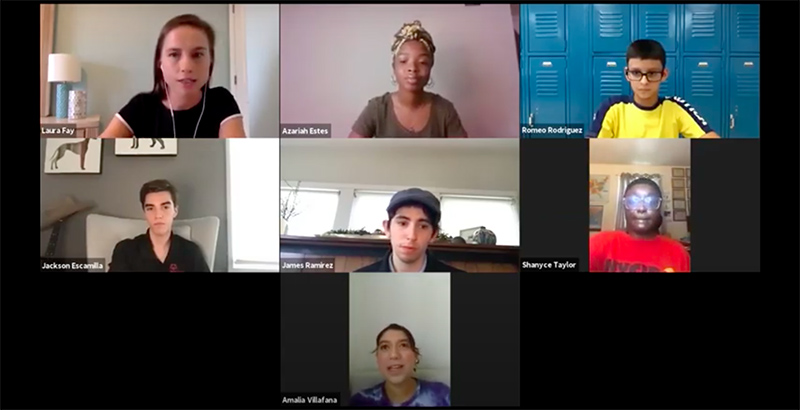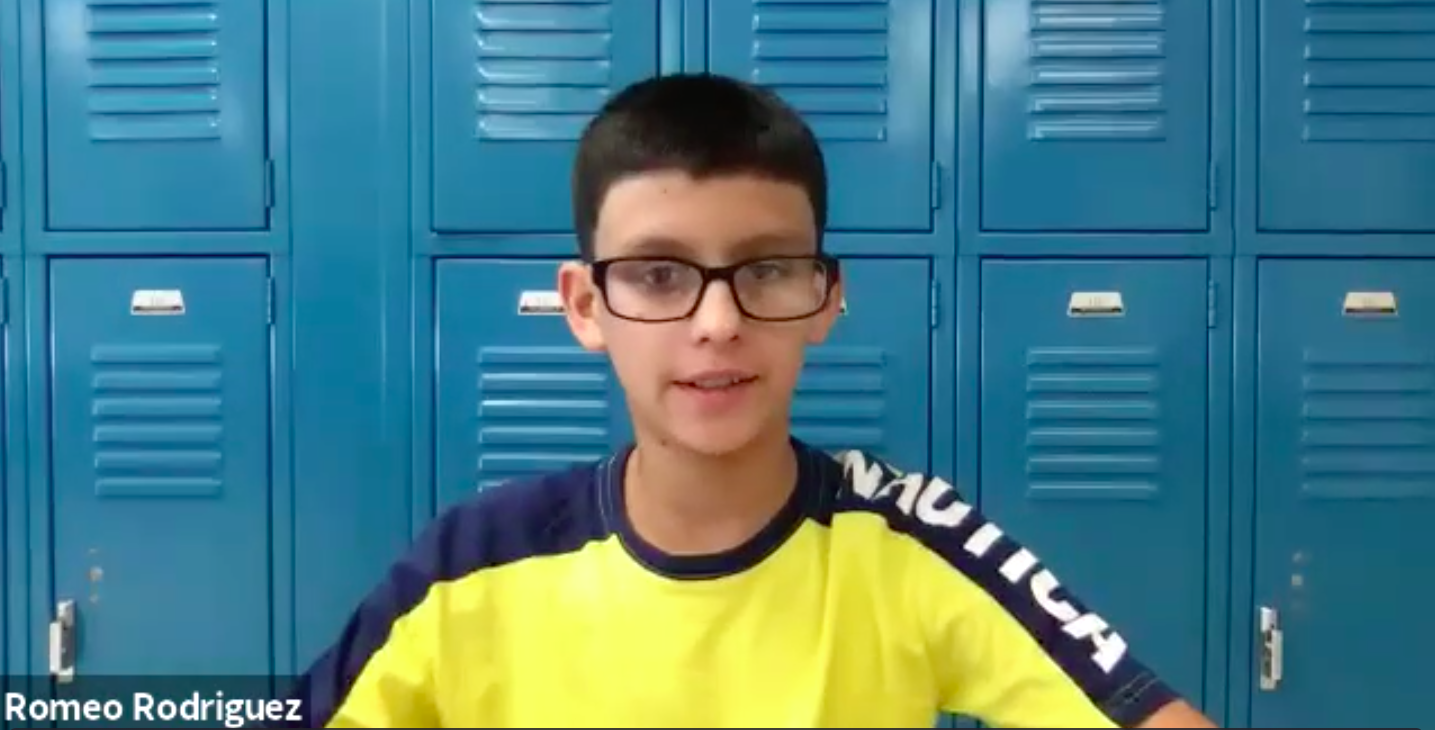53% of Students at Youth Town Hall Report Schools Have Not Sought Their Opinions on Reopening. ‘Realize That We Are the Next Generation of Leaders,’ They Urge

Fifty-three percent of students who participated in The 74’s Virtual Youth Town Hall reported that their schools have not sought their opinions on reopening, while 70 percent of students and adults at the Aug. 26 online forum said their school is not ready for the new academic year.
Though their input might not be sought out by their schools, it was at the Town Hall, a partnership between The 74 and America’s Promise Alliance meant to elevate student voices in the national conversation on reopening schools amid the twin pandemics of coronavirus and systemic racism. More than 500 people tuned in as a diverse group of six student panelists from across the country shared their thoughts. The panel was moderated by Laura Fay, a reporter and digital producer at The 74 who is a former middle school teacher.
Romeo Rodriguez, a seventh-grade student from Blacksburg, South Carolina, was the only panelist who had already returned to in-person classes under a hybrid model. Also the youngest in the group, Romeo sounded a bit melancholy as he answered the question so many in the audience wanted to know: What’s it like? It’s “very different from regular days,” he explained, with fewer people in school and the need to wear masks and not take them off unless you’re six feet away from someone.
“It’s just very difficult to remember all this,” he said. “It can be very overwhelming with the rules.”

While the logistics and learning challenges of returning to school were dissected, a dominant theme was the need to prioritize mental health and “focus on relationships,” as Amalia Villafana, an 11th-grader from Forest Grove, Oregon, said.
The panelists emphasized students’ many potential stressors during COVID-19, and Villafana asked teachers to step “into the students’ shoes.”
“People are not going home to the best families, not going home to the best circumstances, their mental health could be anywhere in the world,” said panelist Shanyce Taylor, a 12th-grader from Staten Island. “Have that compassion when we go back.”
According to a nationally representative survey of more than 3,000 high school students that America’s Promise Alliance conducted this past spring, over 1 in 4 young people reported feeling unhappy, feeling depressed or losing sleep because of worry. With the increasing severity of the COVID pandemic this summer, that figure has likely only risen, Gabe Abdellatif, a college senior and America’s Promise Alliance youth trustee, told the audience.
Taylor believes that teachers can be a key support for students in this time. “It really does say a lot when teachers walk up to you, or when they email you, or go on [Zoom] and just say, ‘Is everything all right?’”
And it goes both ways, noted panelist Azariah “Z” Estes, an 11th-grader from St. Louis, Missouri. Teachers are in a difficult spot and could easily become emotionally worn out. “Definitely take that time to take care of your own mental [health] so that you’re better prepared to help us students,” she advised.
In the midst of trying circumstances, what students really want to hear from their teachers is: “‘I still care about how you’re doing,’” said Taylor.
‘The next generation of leaders’
During the forum, participants had the opportunity to answer a number of poll questions about their experience of school during COVID, and their responses came back in real time. Over 67 percent of youth and adults reported that they would be beginning the school year primarily virtual, while only 4 percent said they would begin primarily in-person.
Even in an online setting, the panelists urged their fellow students to make their voices heard. Estes, who had served on an equity task force at her St. Louis high school, recounted that the group often spoke with their administration and had the “conversations that needed to be had — very truthful, very raw.”
Panelist Jackson Escamilla, a San Antonio 12th-grader, is also a part of a student leadership group and attested to the power of small-group conversations led by youth. “I’ve seen everybody change their ideas.”
“Have something in place like the equity committee,” he urged schools.
Ilana Drake, a youth from the audience who has been on her school’s equity task force for three years, advised students on how to create a committee. “Reach out to your principal, to your assistant principal, even to your local community.”
“Like it or not, things are changing,” said Taylor. “Dismissing the opinions of youth is just not going to work. … Realize that we are the next generation of leaders.”
A school year that’s ‘completely different’
Most of all, students emphasized that this year will take creativity and flexibility.
“The most important thing is just to recognize that it’s going to be completely different than what we’re used to,” said audience member and student Allie Ruiz.
As she spoke, the Zoom chat exploded with: “Mic Drop.” “YES mic drop Allie!” “THAT’S IT!!!! Can you guys run the world now?!?!?” — perhaps a window into what it can look like to uplift students in a digital setting.
The panelists urged teachers to take advantage of every way possible to connect with their students. Escamilla, admitting that his classmates “might hate me for this,” advised teachers to “have [students] turn their cameras on. Look at their faces. Make sure they’re doing OK.”
James Ramirez, also a 12th-grade student from San Antonio, suggested that teachers use interactive games to keep students engaged and try out “virtual dance parties” — a sensation from the early days of the coronavirus lockdown.
Ramirez has been able to stay connected to friends by leading virtual workouts for the Special Olympics. Estes, too, has stayed on top of her training. A member of the track and field team, she meets up with teammates but ensures that they space themselves out to every other lane to maintain social distancing.
The forum closed with a last opportunity for panelists to share advice with teachers and principals.
“Having that open line of communication is key to any good relationship with a student or teacher,” began Escamillo. “Keeping in mind that mental health is a huge issue in America, as well as racism, and I think if we have to have these hard talks, it might not be very fun at the beginning, [but] you can really see change in the long run.”
Estes urged teachers — and all adults — to continue to educate themselves about what is happening in the world, to continue to “be learning, ready and information-hungry.”
On his turn, Ramirez paused and leaned back in his chair.
“Just let students know you care.”
This town hall highlighting the perspectives of American youth is sponsored by Pure Edge, Inc., a foundation that equips educators and learners with strategies for combating stress and developing social, emotional and academic competencies, and Sanford Harmony/National University System, which is focused on building supportive learning communities where all students feel connected, valued and heard through social and emotional learning.
Disclosure: Carnegie Corporation of New York and Chan Zuckerberg Initiative provide financial support to America’s Promise Alliance and The 74.
Get stories like these delivered straight to your inbox. Sign up for The 74 Newsletter

;)
